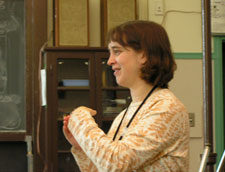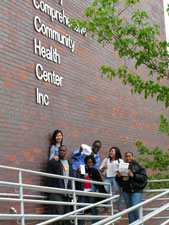teaches Biology at Boston Latin Academy.

Area Doctors (contacted by students)
Roxbury Comprehensive Health Center
Boston Asthma Initiative
Women’s Voices for the Earth
Nonprofit Health Agencies (contacted by students)

| Classroom Activities | |
• |
Study human body systems & their disorders |
| • | Synthesize information from several sources: anatomy/physiology books, web sites, resources on environmental health issues, etc. |
| • | Conduct plant toxin lab to see effects of environmental toxins on growth of organism |
| • | Break into teams that select & concentrate on one body system & its disorders |
| • | Develop team reflection/action plans on selected body systems & environmental related disorders |
| • | Identify & contact doctors & nonprofit health agencies for interviews |
| • | Plan lessons & make posters |
| • | Organize Health Fair at local Health Center |
| Community Activities | |
• |
Survey community members about environmental health issues |
| • | Visit & interview doctors & representatives from nonprofit health agencies |
| • | Teach class about selected body system & related environmental health issues |
| • | Invite other classes, parents & community members to Health Fair |
| • | Share posters, reflections & action plans with community |
| • | Conduct Health Fair & receive positive feedback from community & partners |
Attitudinal changes became clear toward the end of the project, when students synthesized their research to present at the Health Fair and wrote their reflection/action plans. . . . As we discussed findings, student awareness of the impact of environmental pollutants jumped. Especially telling was when they presented posters for one another and realized that what one group advocated, another group considered a hazard! For instance, students studying allergies and the immune system recommended washing bedding in bleach. But the endocrine system team identified chlorine bleach as an estrogen mimic and endocrine disruptor. . . . The primary shift I hoped to see was for the several students interested in medical careers to understand the importance of considering and addressing medical problems in the larger social context. Based on their reflections, I think nearly all my students made this shift.
To me, the most challenging part of the project was teaching the class. I didn’t think it would be that hard, but I found it hard to teach just one lesson. I can’t even imagine what it is like for a teacher to come up with new and exciting ways to teach 180 days out of the year. . . . Doctors can become more aware of the larger social context of disorders they treat by getting involved in the community. They should visit community health centers to get another view besides the big hospital scene. . . . I found that there are some doctors trying to get involved like the Greater Boston Physicians for Social Responsibility. It is a nonprofit that deals with issues like endocrine disruption. There is also the worldwide organization Doctors without Borders. Quite simply, doctors should take time out their busy schedule to see what is really going on in the environment and how it is affecting people’s health.